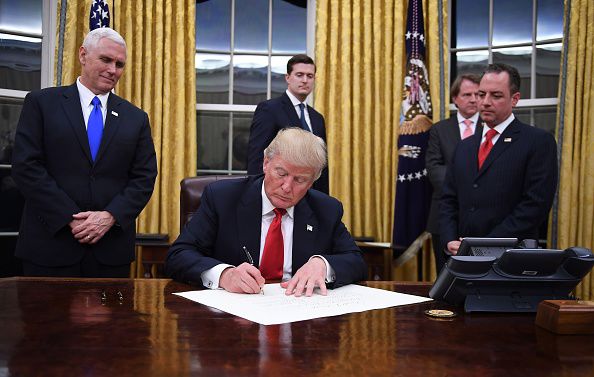Opposition to death penalty grows as Trump administration sets to restart federal penalty

President Donald Trump signs a document on the Resolute Desk in the Oval Office.
November 18, 2019
Capital punishment has long been a highly debated topic in the United States, and opposition to it is increasing in recent years.
A 2018 Pew survey found 39 percent of Americans are opposed to the death penalty for people convicted of murder, which is up from 18 percent in 1996.
The federal death penalty is a legal punishment under United States code. It can be imposed for treason, large-scale drug trafficking and murder, among other offenses.
Despite the number of offenses eligible, the federal government has not executed a death row inmate since 2003.
There are currently 61 prisoners on the federal death row, compared to around 2,500 on death rows in states, according to the nonprofit Death Penalty Information Center.
In recent months, President Donald Trump’s administration has moved to revive the federal death penalty. The Trump administration plans on executing five inmates in December and January, according to a release from the Department of Justice.
Democratic frontrunner and former Vice President Joe Biden proposed terminating the federal death penalty.
Biden’s view on the federal death penalty has changed over the years. As a senator in 1994, Biden voted for a bill allowing 60 crimes to be eligible for the death penalty.
Biden is not the only Democratic candidate that has openly opposed the federal death penalty.
A majority of the Democratic presidential candidates have said they are opposed to capital punishment and would abolish the federal death penalty.
Montana Gov. Steve Bullock is the only Democratic candidate that supports the federal death penalty; however, Bullock supports it in “limited circumstances.”
“I wouldn’t take it off the table from the most extreme circumstances, like terrorism,” Bullock said in an interview with the New York Times.
The death penalty has been a political issue in the past, but in the 2020 election it may not be the biggest topic, said Dirk Deam, associate teaching professor of political science.
Opposing the death penalty used to be an unpopular position in politics, having less than 20 percent support among Americans, according to the Pew survey, but in recent years the Democratic Party has come to a near-consensus of opposing it.
In 2016, the party adopted a platform calling for the abolition of capital punishment.
The party’s platform called capital punishment “a cruel and unusual form of punishment” that “has no place” in the nation.
Hillary Clinton, the Democrats’ nominee in 2016, supported the death penalty in certain circumstances.
The Democratic Party created their 2016 platform due to the “abuse” of the death penalty and “inhumane” act of it.
“Since 1973, over 160 individuals in this country have been sentenced to death and were later exonerated,” Biden said in a tweet responding to the Trump administration restarting federal executions. “Because we can’t ensure that we get these cases right every time, we must eliminate the death penalty.”
Trump has advocated for the imposition of the death penalty in various cases over past decades. In 1990, during the Central Park Five case, Trump paid for a full page ad in the New York Times calling for the state to reinstate its death penalty. The five people in the case were convicted but later exonerated with the city and state of New York paying them millions of dollars in settlement for wrongful convictions.






